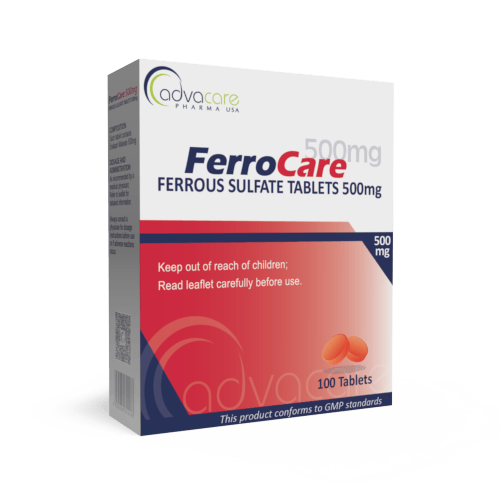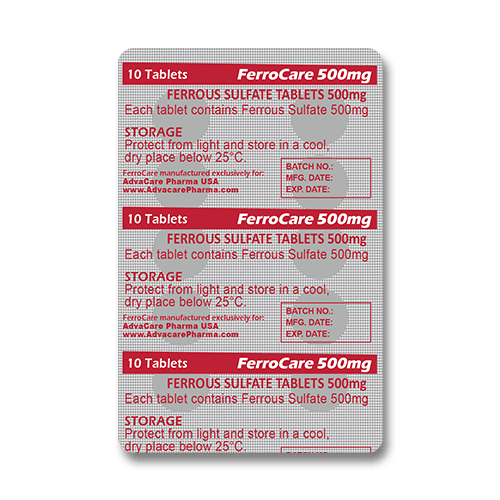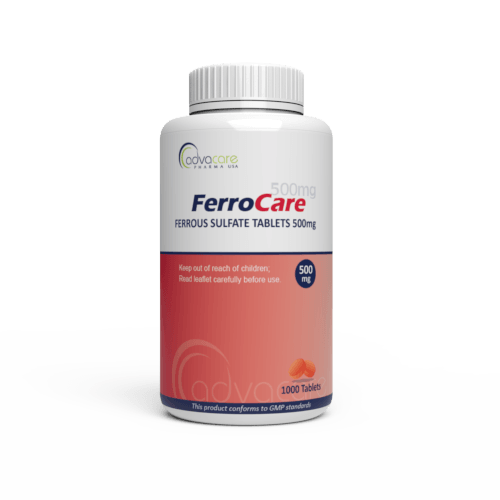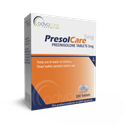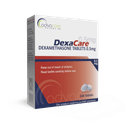- Home›
- Pharmaceuticals›
- Pharmaceutical Tablets›
- Ferrous Sulfate Tablets
Ferrous Sulfate Tablets
Dosage
Packaging
What is Ferrous Sulfate?
Active Ingredients: Ferrous Sulfate
Ferrous Sulfate Tablets are an iron supplement used to treat and prevent anemia (a lack of red blood cells due to iron deficiency). Anemia is especially common in women in their adolescence and childbearing ages. Blood loss or a diet that is low in iron may also lead to iron deficiency anemia.
Ferrous sulfate may also be known as ferrous sulphate, FeSO4, iron sulfate, or slow FE.
Ferrous sulfate is a product of iron and sulfuric acid. Iron is an essential mineral for the human body. This mineral becomes a part of hemoglobin, which carries oxygen in the blood and myoglobin which stores oxygen in muscle cells.
Ferrous sulfate contains about 20% of the element iron. One 200mg tablet of ferrous sulfate is equivalent to approximately 65mg of ferrous iron.
AdvaCare Pharma is a global supplier and producer of Ferrous Sulfate Tablets. This medicine is produced in our GMP-certified facilities in China, India, and the USA. We routinely inspect our manufacturing facilities to ensure our products meet health, safety, and environmental standards.
Why are we a trusted Ferrous Sulfate manufacturer?
As a reputable Ferrous Sulfate manufacturer, we are dedicated to ensuring that GMP guidelines and standards strictly apply to the manufacture of our entire range of 200+ pharmaceutical treatments in tablet dosage form.
AdvaCare Pharma is an American pharmaceutical company committed to the manufacture of high-quality, affordable pharmaceuticals for a global market. The extensive international network that we partner with includes pharmaceutical distributors, hospitals, pharmacies, and a variety of other medical institutions. Our vision is to manufacture Ferrous Sulfate Tablets, and other quality-assured oral solid treatments, that get into the hands of those that need them most.
Uses
What is Ferrous Sulfate used for?
It is used to treat iron deficiency caused by conditions like anemia, endometriosis, or pregnancy.
How should Ferrous Sulfate Tablets be used?
This medication is intended to be taken orally. Ferrous Sulfate Tablets work more efficiently when taken on an empty stomach. If this drug causes an upset stomach, it may be taken with food.
Should Ferrous Sulfate Tablets be taken with food?
Oral Ferrous Sulfate Tablets work most effectively when they are taken on an empty stomach. However, the tablets may cause gastrointestinal discomfort as a side effect, so it may be necessary to take the medication with a meal. It is important to note that different types of food may increase or decrease the absorption of Ferrous Sulfate.
How should Ferrous Sulfate Tablets be stored?
It is recommended to keep the tablets in their original packaging until use. They should be stored in a location between 15-30°C.
What dose should be taken?
Note on dosages: Ferrous Sulfate (FeSO4) contains about 20% elemental iron, hence dosages are listed with respect to Ferrous Sulfate.
Recommended dosage may vary based on different medical conditions and for specific groups of patients.
Adult Dosing Dosage may vary based on different medical indications:
- For the treatment of iron deficiency, the usual dose is 500mg per day, taken in 1-3 divided doses. The duration of treatment should be 3 months. Alternative schedules are also appropriate 200-500mg can be taken 3 times per week, such as on Monday, Wednesday, and Friday, for 2 to 6 months. For more severe cases, 200-500mg can be taken daily for 2-6 months.
- For the prevention of iron deficiency, the usual dose is 200mg, taken once per day.
- For the treatment of iron deficiency associated with chronic renal failure, the usual dose is 1000mg per day (200mg elemental iron), taken in 1-3 divided doses. If the response to oral iron is insufficient after 1-3 months, it is advised to consider IV supplementation. It should be noted that smaller daily doses may be better tolerated than larger doses.
- For dietary supplementation, the usual dose will vary based on individual patients. A dietary reference intake table should be referenced before the treatment plan is finalized.
Renal Dosing Guidelines for patients with renal impairment have not been defined.
Hepatic Dosing Guidelines for patients with hepatic impairment have not been defined.
Pediatric Dosing Recommended dosage for children may vary based on different medical conditions:
- For the treatment of iron deficiency in children aged 5 to 12 years old, the usual dose is 200mg per day divided and given in 1-3 doses. The treatment should continue for 3 months.
- For the treatment of iron deficiency in preadolescents and adolescents, the usual dose is 200-500mg per day. The dose should be divided and taken in 1-3 doses each day. Alternatively, for mild cases, 200-500mg can be taken 3 times per week, such as on Monday, Wednesday, and Friday, for at least 3 months.
- For dietary supplementation, the usual dose should be individualized based on life stage and other factors. It is recommended to consult a dietary reference intake table when determining needs.
Renal Dosing for pediatrics Guidelines for children with renal impairment have not been defined.
Hepatic Dosing for pediatrics Guidelines for children with hepatic impairment have not been defined.
The dosage is based on medical condition, response to treatment, age, and weight. Refer to a doctor or pharmacist for guidelines on dosage. Do not exceed what they advise.
What happens if a dose of Ferrous Sulfate is missed?
In the event of a missed dose, the dose should be taken as soon as it is remembered. However, if it is nearly time for the next scheduled dose, the missed dose should be skipped. Never take 2 doses at the same time.
Who can use Ferrous Sulfate?
Ferrous Sulfate Tablets can be given to adults and children, but caution is advised for specific groups of patients.
Pregnant Ferrous Sulfate can be used by women who are pregnant. Human data does not indicate fetal harm when used at recommended doses.
Breastfeeding Ferrous Sulfate can be used by women who are breastfeeding. Though there is no known risk to the nursing infant, it should be noted that constipation or diarrhea may be possible due to the properties of this medication. There is not enough human data available to evaluate the effects on milk production.
Children Ferrous Sulfate Tablets are safe and efficacious for some children over 12 years old. It is important to note that they should not be used for children younger than 12 years old unless under the guidance of a healthcare professional. Pediatric patients are more susceptible to iron toxicity and fatalities may be due to accidental overdose of iron-containing products.
Geriatric It is important to note that elderly patients do not always absorb iron with the same efficiency as younger patients, so increased doses may be necessary.
Other warnings
Ferrous Sulfate Tablets are contraindicated for patients with iron overload syndromes including hemochromatosis, those with blood disorders including paroxysmal nocturnal hemoglobinuria, hemolytic anemia, and hemosiderosis and patients with active peptic ulcer, ulcerative colitis, and Crohn’s disease. It is also contraindicated for patients who receive frequent blood transfusions or who are undergoing concomitant parenteral iron therapy with dimercaprol.
It is advised to use caution for patients who have hemoglobinopathies, iron storage or absorption disease, those who have current GI disease, intestinal strictures, diverticula, or a history of peptic ulcer or inflammatory bowel disease.
Side Effects
As with all pharmaceuticals, some unwanted effects can occur from the use of Ferrous Sulfate Tablets.
Many common side effects are temporary and may lessen during treatment. Some common side effects include, but may not be limited to:
- stomach pain
- diarrhea
- constipation
- change in color of stools
- upset stomach
- stomach cramps
Severe side effects are rare. It is advised to seek medical attention in the case of an allergic reaction.
For a comprehensive understanding of all potential side effects, consult a medical professional.
If any symptoms persist or worsen, or you notice any other symptoms, please call your doctor immediately.
Precautions
Do NOT use Ferrous Sulfate Tablets if:
- You are allergic to any of the ingredients in the tablet.
- You have iron overload syndrome (e.g. primary hemochromatosis or hemosiderin).
- You have regular blood transfusions.
- You have porphyria or thalassemia.
- You have hemolytic anemia.
- You have PUD (peptic ulcer disease).
- You have Crohn's disease or ulcerative colitis.
- You have an alcohol addiction.
Before treatment, consult your doctor regarding any medications you are taking to address potential drug interactions.This product may interfere with many types of drugs. It is known to decrease the absorption of bisphosphonates, levodopa, penicillamine, quinolone antibiotics (e.g. ciprofloxacin, levofloxacin, norfloxacin, moxifloxacin, ofloxacin), tetracycline antibiotics (e.g. doxycycline, minocycline), drugs for thyroid problems (e.g. levothyroxine), and entacapone. It is also known to reduce the bioavailability of methyldopa. Ferrous sulfate may have a reduced absorption when used with antacids, bicarbonates, carbonates, oxalates, and drugs containing zinc, magnesium, calcium, or phosphorous. It may also have reactions with cholestyramine chloramphenicol, and ascorbic acid (vitamin C). This is not a complete list.
This medication may not be suitable for people with certain conditions, so it is important to consult with a doctor if you have any health conditions. Special considerations or adjusted doses may be necessary for conditions such as:
- HIV infection
- hypochlorhydria
- chronic use of ferrous sulfate
- liver problems
This medication should not be taken at the same time as an antacid. It is recommended to wait at least 2 hours between Ferrous Sulfate Tablets and an antacid.
Treatment with Ferrous Sulfate Tablets may interfere with the results of certain types of lab tests, such as a fecal occult blood test. It is important to inform laboratory staff if you are taking this medicine.
Food impacts the absorption of ferrous sulfate. Foods such as tea, coffee, milk, eggs, and whole grains are associated with decreased absorption of iron, while meat is linked to an increased absorption of iron.
References
Comparison of ferrous sulfate and ferrous glycinate chelate for the treatment of iron deficiency anemia in gastrectomy patients
Postgastrectomy iron deficiency anemia occurs in 20-50% of patients. This study is an experiment that included 18 patients with iron deficiency anemia and compared the effects of ferrous sulfate and ferrous glycinate chelate in the treatment process of anemia.
These patients received either ferrous sulfate (group 1) or ferrous glycinate chelate (group 2) for 4 months. Group 1 demonstrated improvements in laboratory parameters, with significant increases in mean corpuscular hemoglobin (P = 0.02), serum iron (P = 0.02), and ferritin (P = 0.04), and a significant decrease in transferrin (P = 0.002) after 4 months. An individualized analysis revealed that only one patient taking ferrous sulfate had anemia at the end of the study, compared to six patients taking ferrous glycinate. Ferritin levels rose above 20μg/L in seven patients using ferrous sulfate, and only one patient using ferrous glycinate showed a similar increase.
The conclusion of this study is that patients with iron deficiency anemia after gastrectomy treated with ferrous sulfate had better results in hematologic laboratory parameters than those who used ferrous glycinate chelate.

You might be interested in...
Why AdvaCare Pharma?
As an industry leader, we are aware of our responsibility to provide affordable and sustainable solutions to improve healthcare worldwide.
